BMP6003 International HRM: UK Firms Navigating Global Expansion Issues
VerifiedAdded on 2023/06/12
|10
|3002
|105
Report
AI Summary
This report examines the cultural and international HRM issues faced by organizations when expanding their business globally, with a specific focus on UK companies entering the Japanese market. It highlights cultural differences in decision-making, innovation, work-life balance, workload, and leadership styles between the UK and Japan. The report further discusses the advantages of cross-cultural operations, such as effective decision-making, accurate problem-solving, and cheaper labor. It also addresses key international HRM issues, including cultural diversity, rewards and recognition, training and development programs, mismanagement due to conflicting strategies, and long working hours. The role of international HRM is crucial in managing the domestic workforce to adapt to the global environment, overcoming cultural and language barriers, and motivating employees to adjust to the new culture.
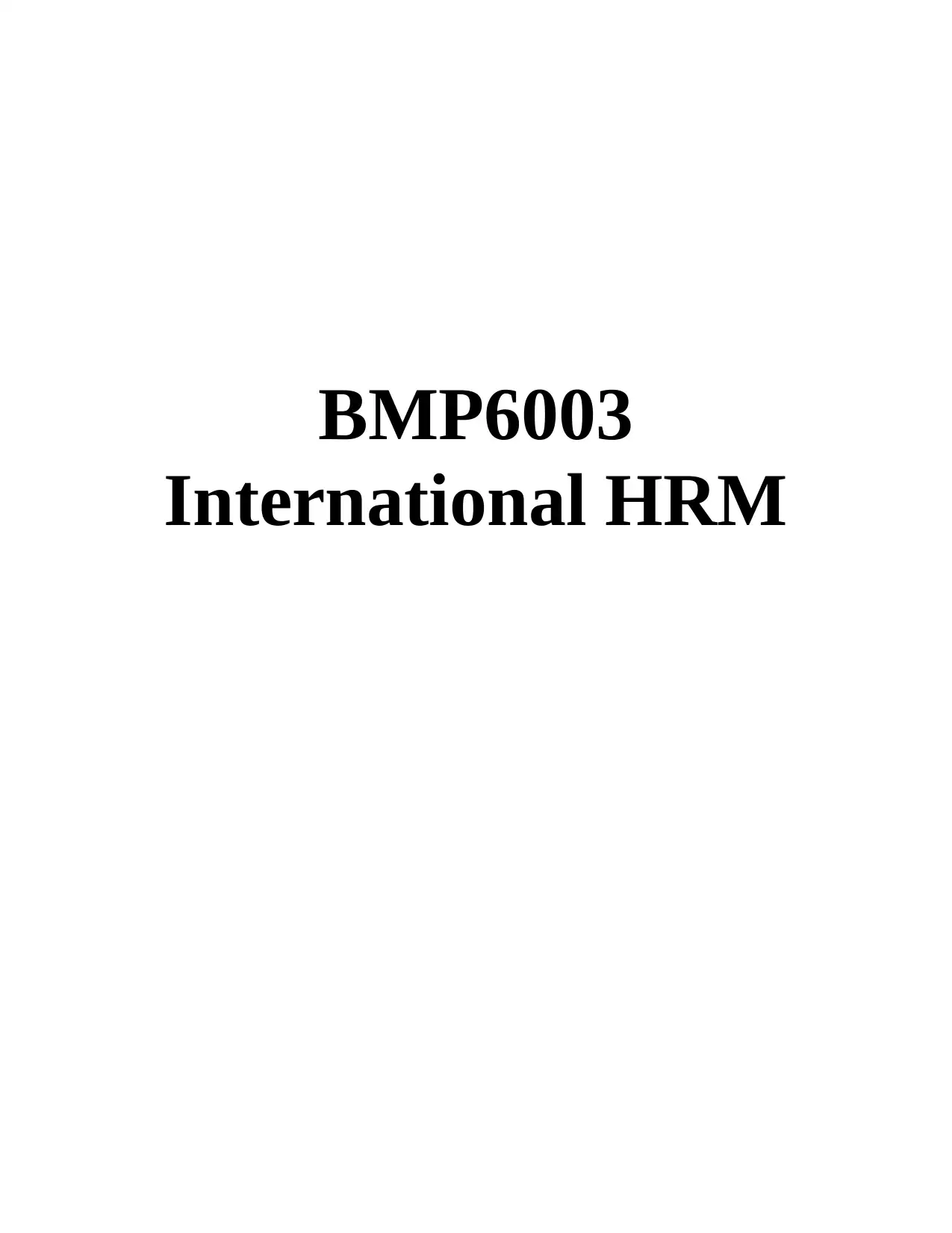
BMP6003
International HRM
International HRM
Paraphrase This Document
Need a fresh take? Get an instant paraphrase of this document with our AI Paraphraser
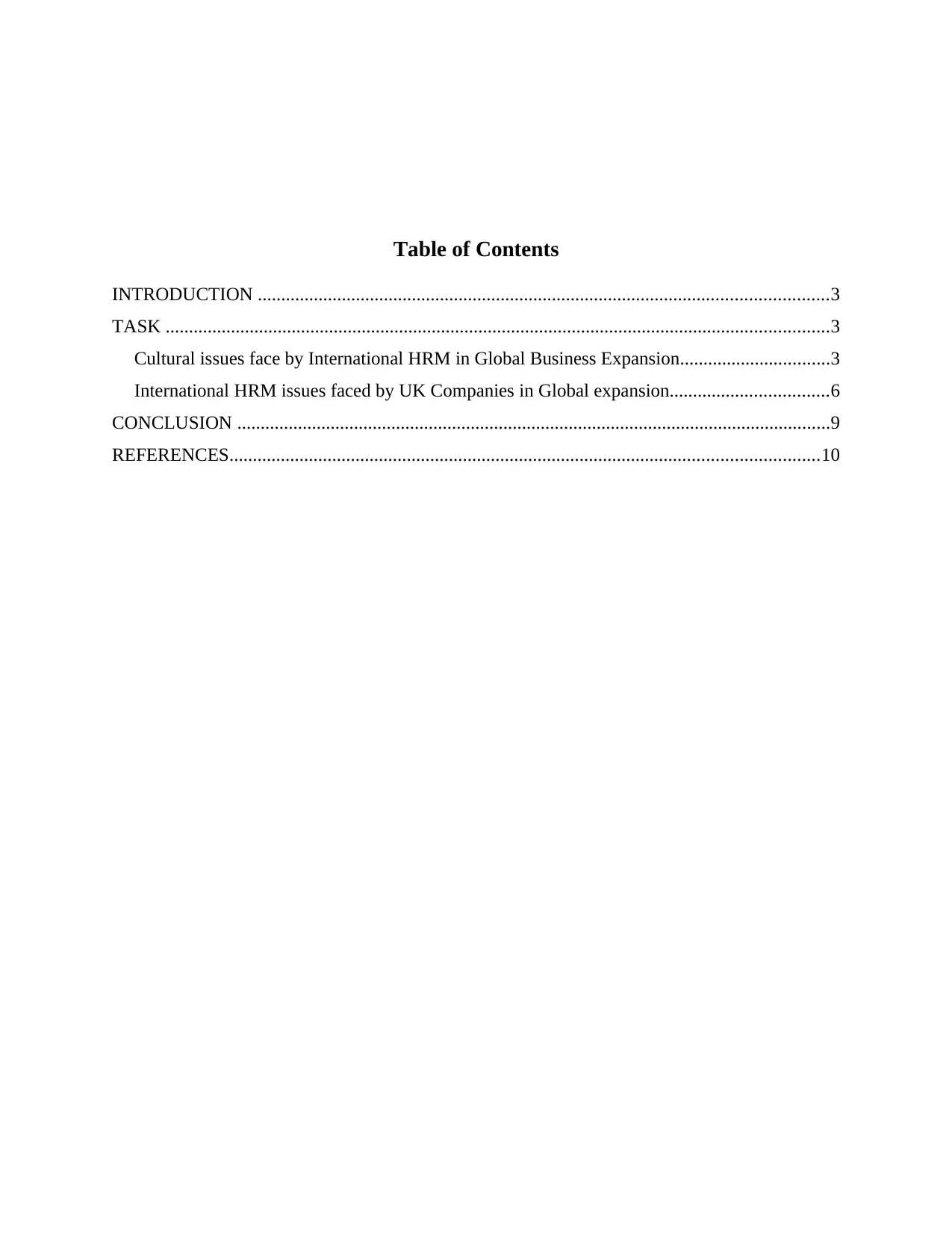
Table of Contents
INTRODUCTION ..........................................................................................................................3
TASK ..............................................................................................................................................3
Cultural issues face by International HRM in Global Business Expansion................................3
International HRM issues faced by UK Companies in Global expansion..................................6
CONCLUSION ...............................................................................................................................9
REFERENCES..............................................................................................................................10
INTRODUCTION ..........................................................................................................................3
TASK ..............................................................................................................................................3
Cultural issues face by International HRM in Global Business Expansion................................3
International HRM issues faced by UK Companies in Global expansion..................................6
CONCLUSION ...............................................................................................................................9
REFERENCES..............................................................................................................................10
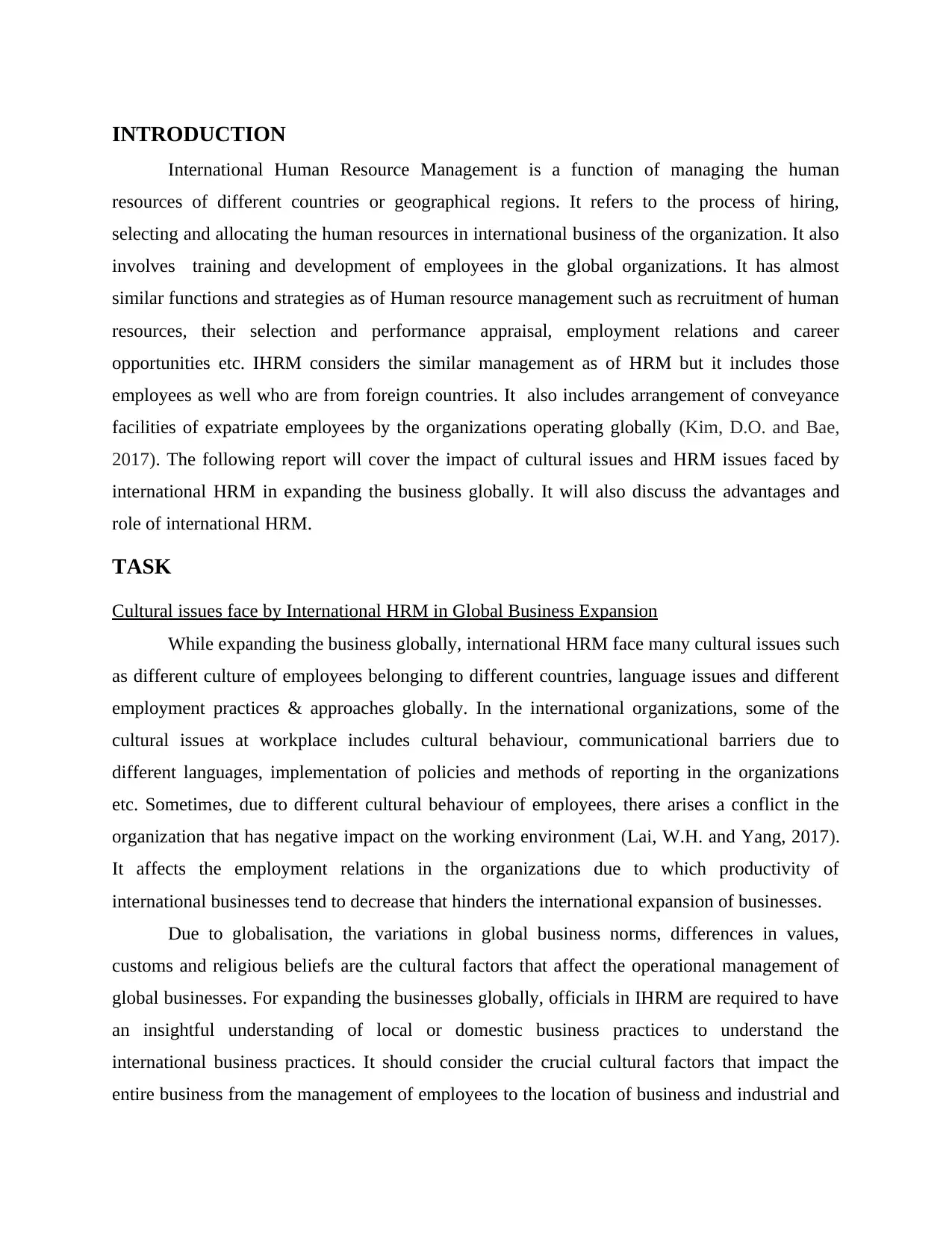
INTRODUCTION
International Human Resource Management is a function of managing the human
resources of different countries or geographical regions. It refers to the process of hiring,
selecting and allocating the human resources in international business of the organization. It also
involves training and development of employees in the global organizations. It has almost
similar functions and strategies as of Human resource management such as recruitment of human
resources, their selection and performance appraisal, employment relations and career
opportunities etc. IHRM considers the similar management as of HRM but it includes those
employees as well who are from foreign countries. It also includes arrangement of conveyance
facilities of expatriate employees by the organizations operating globally (Kim, D.O. and Bae,
2017). The following report will cover the impact of cultural issues and HRM issues faced by
international HRM in expanding the business globally. It will also discuss the advantages and
role of international HRM.
TASK
Cultural issues face by International HRM in Global Business Expansion
While expanding the business globally, international HRM face many cultural issues such
as different culture of employees belonging to different countries, language issues and different
employment practices & approaches globally. In the international organizations, some of the
cultural issues at workplace includes cultural behaviour, communicational barriers due to
different languages, implementation of policies and methods of reporting in the organizations
etc. Sometimes, due to different cultural behaviour of employees, there arises a conflict in the
organization that has negative impact on the working environment (Lai, W.H. and Yang, 2017).
It affects the employment relations in the organizations due to which productivity of
international businesses tend to decrease that hinders the international expansion of businesses.
Due to globalisation, the variations in global business norms, differences in values,
customs and religious beliefs are the cultural factors that affect the operational management of
global businesses. For expanding the businesses globally, officials in IHRM are required to have
an insightful understanding of local or domestic business practices to understand the
international business practices. It should consider the crucial cultural factors that impact the
entire business from the management of employees to the location of business and industrial and
International Human Resource Management is a function of managing the human
resources of different countries or geographical regions. It refers to the process of hiring,
selecting and allocating the human resources in international business of the organization. It also
involves training and development of employees in the global organizations. It has almost
similar functions and strategies as of Human resource management such as recruitment of human
resources, their selection and performance appraisal, employment relations and career
opportunities etc. IHRM considers the similar management as of HRM but it includes those
employees as well who are from foreign countries. It also includes arrangement of conveyance
facilities of expatriate employees by the organizations operating globally (Kim, D.O. and Bae,
2017). The following report will cover the impact of cultural issues and HRM issues faced by
international HRM in expanding the business globally. It will also discuss the advantages and
role of international HRM.
TASK
Cultural issues face by International HRM in Global Business Expansion
While expanding the business globally, international HRM face many cultural issues such
as different culture of employees belonging to different countries, language issues and different
employment practices & approaches globally. In the international organizations, some of the
cultural issues at workplace includes cultural behaviour, communicational barriers due to
different languages, implementation of policies and methods of reporting in the organizations
etc. Sometimes, due to different cultural behaviour of employees, there arises a conflict in the
organization that has negative impact on the working environment (Lai, W.H. and Yang, 2017).
It affects the employment relations in the organizations due to which productivity of
international businesses tend to decrease that hinders the international expansion of businesses.
Due to globalisation, the variations in global business norms, differences in values,
customs and religious beliefs are the cultural factors that affect the operational management of
global businesses. For expanding the businesses globally, officials in IHRM are required to have
an insightful understanding of local or domestic business practices to understand the
international business practices. It should consider the crucial cultural factors that impact the
entire business from the management of employees to the location of business and industrial and
⊘ This is a preview!⊘
Do you want full access?
Subscribe today to unlock all pages.

Trusted by 1+ million students worldwide
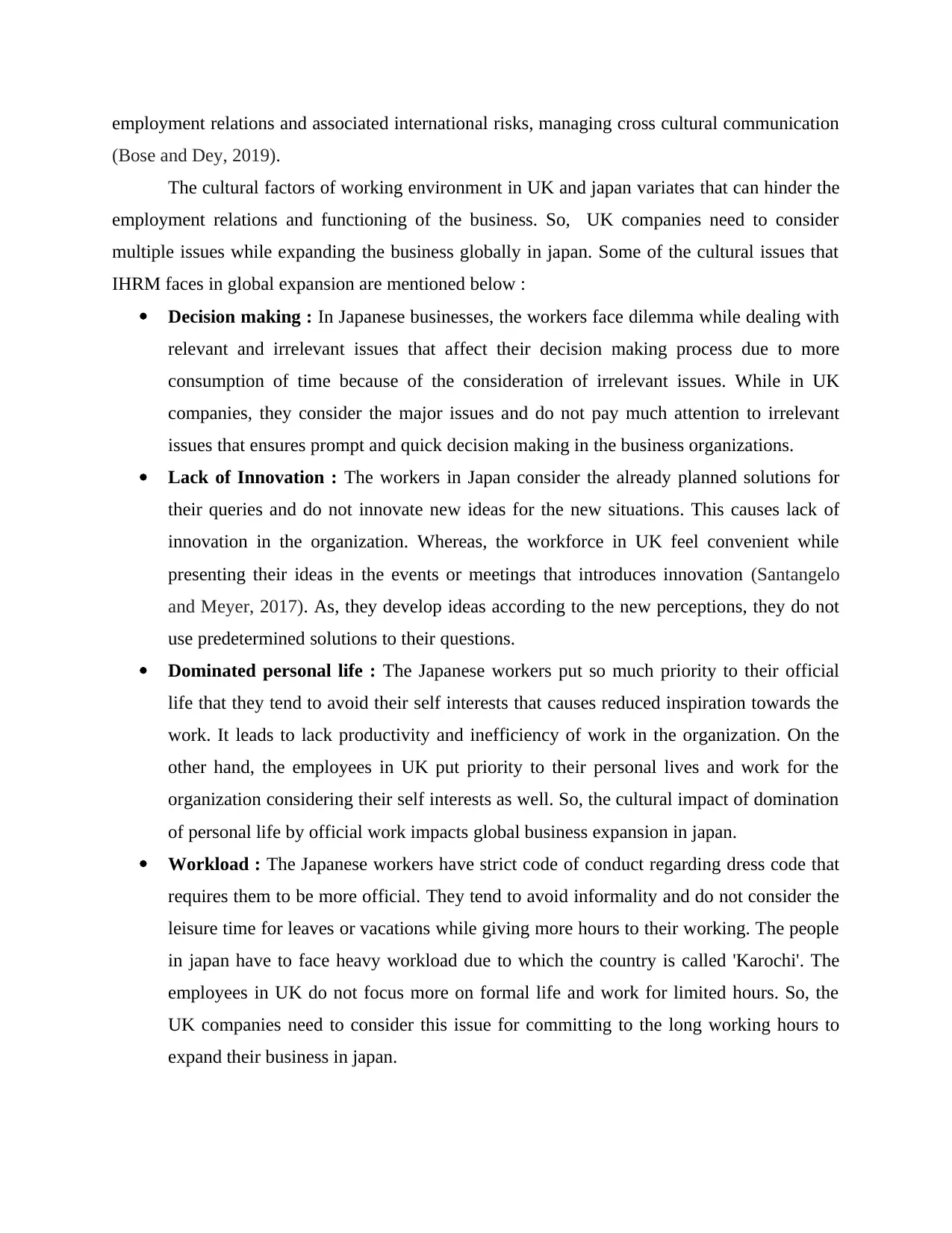
employment relations and associated international risks, managing cross cultural communication
(Bose and Dey, 2019).
The cultural factors of working environment in UK and japan variates that can hinder the
employment relations and functioning of the business. So, UK companies need to consider
multiple issues while expanding the business globally in japan. Some of the cultural issues that
IHRM faces in global expansion are mentioned below :
Decision making : In Japanese businesses, the workers face dilemma while dealing with
relevant and irrelevant issues that affect their decision making process due to more
consumption of time because of the consideration of irrelevant issues. While in UK
companies, they consider the major issues and do not pay much attention to irrelevant
issues that ensures prompt and quick decision making in the business organizations.
Lack of Innovation : The workers in Japan consider the already planned solutions for
their queries and do not innovate new ideas for the new situations. This causes lack of
innovation in the organization. Whereas, the workforce in UK feel convenient while
presenting their ideas in the events or meetings that introduces innovation (Santangelo
and Meyer, 2017). As, they develop ideas according to the new perceptions, they do not
use predetermined solutions to their questions.
Dominated personal life : The Japanese workers put so much priority to their official
life that they tend to avoid their self interests that causes reduced inspiration towards the
work. It leads to lack productivity and inefficiency of work in the organization. On the
other hand, the employees in UK put priority to their personal lives and work for the
organization considering their self interests as well. So, the cultural impact of domination
of personal life by official work impacts global business expansion in japan.
Workload : The Japanese workers have strict code of conduct regarding dress code that
requires them to be more official. They tend to avoid informality and do not consider the
leisure time for leaves or vacations while giving more hours to their working. The people
in japan have to face heavy workload due to which the country is called 'Karochi'. The
employees in UK do not focus more on formal life and work for limited hours. So, the
UK companies need to consider this issue for committing to the long working hours to
expand their business in japan.
(Bose and Dey, 2019).
The cultural factors of working environment in UK and japan variates that can hinder the
employment relations and functioning of the business. So, UK companies need to consider
multiple issues while expanding the business globally in japan. Some of the cultural issues that
IHRM faces in global expansion are mentioned below :
Decision making : In Japanese businesses, the workers face dilemma while dealing with
relevant and irrelevant issues that affect their decision making process due to more
consumption of time because of the consideration of irrelevant issues. While in UK
companies, they consider the major issues and do not pay much attention to irrelevant
issues that ensures prompt and quick decision making in the business organizations.
Lack of Innovation : The workers in Japan consider the already planned solutions for
their queries and do not innovate new ideas for the new situations. This causes lack of
innovation in the organization. Whereas, the workforce in UK feel convenient while
presenting their ideas in the events or meetings that introduces innovation (Santangelo
and Meyer, 2017). As, they develop ideas according to the new perceptions, they do not
use predetermined solutions to their questions.
Dominated personal life : The Japanese workers put so much priority to their official
life that they tend to avoid their self interests that causes reduced inspiration towards the
work. It leads to lack productivity and inefficiency of work in the organization. On the
other hand, the employees in UK put priority to their personal lives and work for the
organization considering their self interests as well. So, the cultural impact of domination
of personal life by official work impacts global business expansion in japan.
Workload : The Japanese workers have strict code of conduct regarding dress code that
requires them to be more official. They tend to avoid informality and do not consider the
leisure time for leaves or vacations while giving more hours to their working. The people
in japan have to face heavy workload due to which the country is called 'Karochi'. The
employees in UK do not focus more on formal life and work for limited hours. So, the
UK companies need to consider this issue for committing to the long working hours to
expand their business in japan.
Paraphrase This Document
Need a fresh take? Get an instant paraphrase of this document with our AI Paraphraser

Costly Formation : It requires huge expenditure to form the business operations in Japan
due to its high quality products and services. To establish the business globally, it
requires high investments. The big company such as Tesco also got failed to establish its
operations in japan due to cultural issues there. The culture of high quality services
demands heavy price that involves huge investments due to which expansion of UK
business in japan gets affected.
Barriers of Culture : The cultural factors of values, languages and cross communication
of global businesses affect the smooth functioning of business and impact the prompt
decision making. Initially, while Emma Ball Ltd. Commenced its business operations in
Japan, it faced communication issues there because of language differences but then
gradually it got adjusted in the its working environment that led to growth of business
expansion in Japan.
Autocratic Leadership : The employees in japan depend on the autocratic leadership i.e.
they conduct their work depending on the directions given by their respective leaders. On
the other hand, the workforce in Japan have democratic style of leadership that involves
autonomy for taking decisions regarding their tasks (Maley and Moeller, 2018). So, the
difference in leadership styles and working styles is a major cultural issue that UK
companies need to consider while expanding their business in Japan.
Advantages of cross culture to companies
The UK companies may get the advantage to expand their business while facing major issues in
cross culture environment if they try to overcome the obstacles related to culture.
The advantages of expanding operations in Japan are discussed below-
Making effective decision- The Japanese manpower work in a systematic and organised
manner where they research on minute details before taking any decision. Overlapping of
decisions can be eliminated by the autocratic style of leadership. In Japan work is
considered as their priority rather than their personal life which helps in building their
business empire. This leads the UK companies in expanding their business operations as
they have habit of effective decision making (Gupta and Pathak, 2018).
Accurate solution to problems- The people of Japan have developed their various
principles to eliminate or tackle with their problem. The approaches are completely based
on Japanese culture and tradition by which people can find their solution through these
due to its high quality products and services. To establish the business globally, it
requires high investments. The big company such as Tesco also got failed to establish its
operations in japan due to cultural issues there. The culture of high quality services
demands heavy price that involves huge investments due to which expansion of UK
business in japan gets affected.
Barriers of Culture : The cultural factors of values, languages and cross communication
of global businesses affect the smooth functioning of business and impact the prompt
decision making. Initially, while Emma Ball Ltd. Commenced its business operations in
Japan, it faced communication issues there because of language differences but then
gradually it got adjusted in the its working environment that led to growth of business
expansion in Japan.
Autocratic Leadership : The employees in japan depend on the autocratic leadership i.e.
they conduct their work depending on the directions given by their respective leaders. On
the other hand, the workforce in Japan have democratic style of leadership that involves
autonomy for taking decisions regarding their tasks (Maley and Moeller, 2018). So, the
difference in leadership styles and working styles is a major cultural issue that UK
companies need to consider while expanding their business in Japan.
Advantages of cross culture to companies
The UK companies may get the advantage to expand their business while facing major issues in
cross culture environment if they try to overcome the obstacles related to culture.
The advantages of expanding operations in Japan are discussed below-
Making effective decision- The Japanese manpower work in a systematic and organised
manner where they research on minute details before taking any decision. Overlapping of
decisions can be eliminated by the autocratic style of leadership. In Japan work is
considered as their priority rather than their personal life which helps in building their
business empire. This leads the UK companies in expanding their business operations as
they have habit of effective decision making (Gupta and Pathak, 2018).
Accurate solution to problems- The people of Japan have developed their various
principles to eliminate or tackle with their problem. The approaches are completely based
on Japanese culture and tradition by which people can find their solution through these

approaches. Their approach is to focus on the question rather than answer and after that
they take decision through Consensus till the final decision is made. This helps the UK
companies with this type of culture where the problems are taken seriously to reach the
accurate solution.
Cheap labour- The workforce in Japan is cheaper than UK where if a company is
expanding its business operations in Japan shall have skilled employees in low cost. This
lead in the optimum utilisation of the resources in a cost effective manner.
Lifetime training sessions- The Japanese workforce majorly focus on giving continuous
training where they believe if the training is stopped there will be downfall in the
productivity skill or creativity. The staff is needed to be trained until it reaches to the
standard of its performance. Japanese companies have a set of standard training for every
job and are mandatory to train the employees until it reaches on its plateau (Wilkinson
and Dundon, 2021).
Role of IHRM
The international HRM must focus on managing its domestic workforce in a specific
manner so that they are able to adapt or adjust in the environment. The cultural differentiation
leads to the professional misunderstanding which becomes a challenge for IHRM. Appropriates
and skilled staff must be there in order to eliminate the challenge of cultural and language
barrier. The recruitment should be based on specific standards and educational qualifications so
that the company can utilise the manpower in a very effective manner (Legge, 2020). The top
authority must aware to all the new employees about the culture and organizational structure of
the company. The employees must be given motivation in order to increase their potential and
their productivity so that they can give their best in adjusting into the culture.
International HRM issues faced by UK Companies in Global expansion
The employees are the most crucial resource for any organization as they contribute the
most for achieving the objectives of the organization. So, it is imperative to have an effective
human resource management in the business. It involves arrangement of employees regarding
recruitment, training and development, monitoring for performance appraisal. HRM of the
company needs to consider employee well being and employment relations for global business
expansion.
they take decision through Consensus till the final decision is made. This helps the UK
companies with this type of culture where the problems are taken seriously to reach the
accurate solution.
Cheap labour- The workforce in Japan is cheaper than UK where if a company is
expanding its business operations in Japan shall have skilled employees in low cost. This
lead in the optimum utilisation of the resources in a cost effective manner.
Lifetime training sessions- The Japanese workforce majorly focus on giving continuous
training where they believe if the training is stopped there will be downfall in the
productivity skill or creativity. The staff is needed to be trained until it reaches to the
standard of its performance. Japanese companies have a set of standard training for every
job and are mandatory to train the employees until it reaches on its plateau (Wilkinson
and Dundon, 2021).
Role of IHRM
The international HRM must focus on managing its domestic workforce in a specific
manner so that they are able to adapt or adjust in the environment. The cultural differentiation
leads to the professional misunderstanding which becomes a challenge for IHRM. Appropriates
and skilled staff must be there in order to eliminate the challenge of cultural and language
barrier. The recruitment should be based on specific standards and educational qualifications so
that the company can utilise the manpower in a very effective manner (Legge, 2020). The top
authority must aware to all the new employees about the culture and organizational structure of
the company. The employees must be given motivation in order to increase their potential and
their productivity so that they can give their best in adjusting into the culture.
International HRM issues faced by UK Companies in Global expansion
The employees are the most crucial resource for any organization as they contribute the
most for achieving the objectives of the organization. So, it is imperative to have an effective
human resource management in the business. It involves arrangement of employees regarding
recruitment, training and development, monitoring for performance appraisal. HRM of the
company needs to consider employee well being and employment relations for global business
expansion.
⊘ This is a preview!⊘
Do you want full access?
Subscribe today to unlock all pages.

Trusted by 1+ million students worldwide
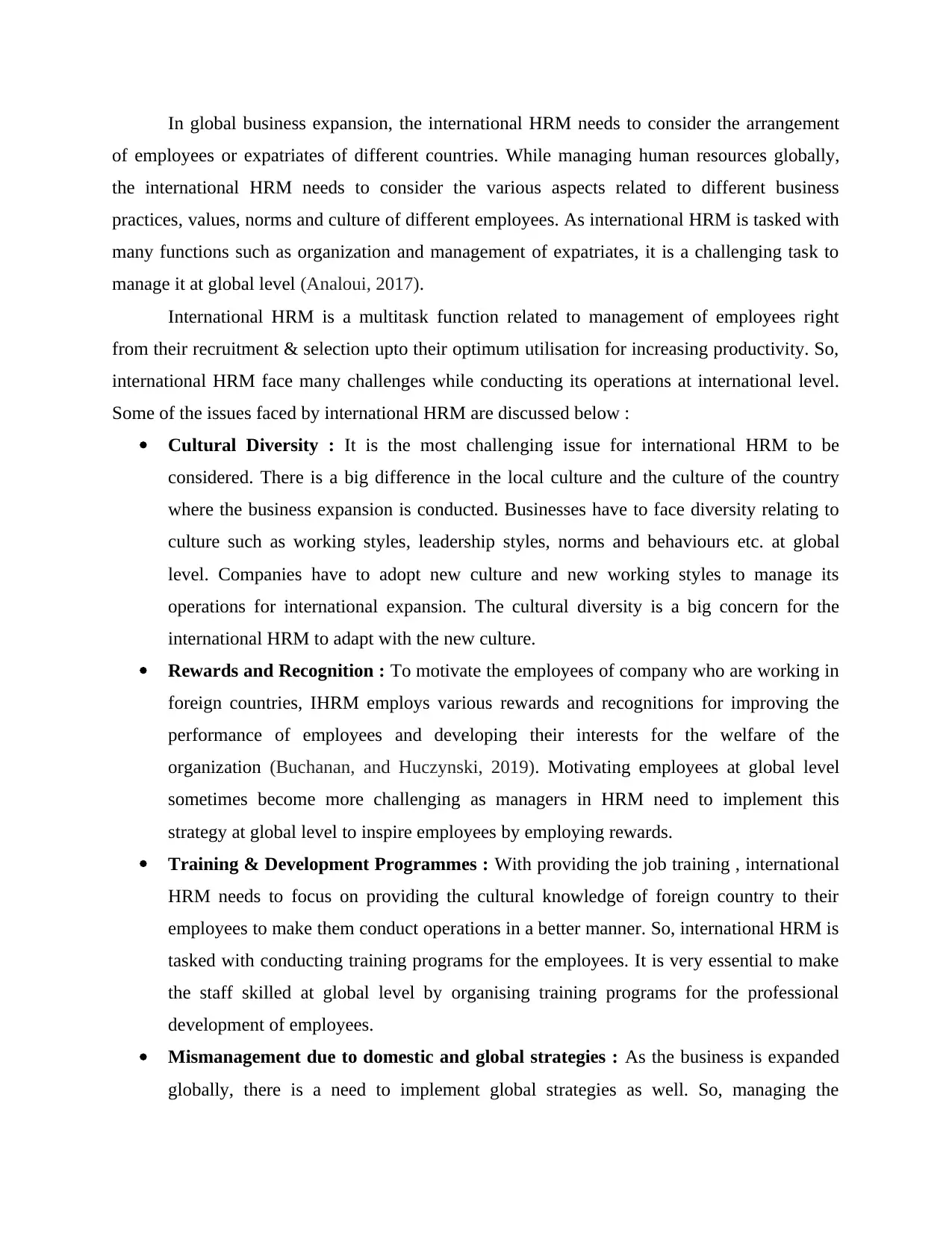
In global business expansion, the international HRM needs to consider the arrangement
of employees or expatriates of different countries. While managing human resources globally,
the international HRM needs to consider the various aspects related to different business
practices, values, norms and culture of different employees. As international HRM is tasked with
many functions such as organization and management of expatriates, it is a challenging task to
manage it at global level (Analoui, 2017).
International HRM is a multitask function related to management of employees right
from their recruitment & selection upto their optimum utilisation for increasing productivity. So,
international HRM face many challenges while conducting its operations at international level.
Some of the issues faced by international HRM are discussed below :
Cultural Diversity : It is the most challenging issue for international HRM to be
considered. There is a big difference in the local culture and the culture of the country
where the business expansion is conducted. Businesses have to face diversity relating to
culture such as working styles, leadership styles, norms and behaviours etc. at global
level. Companies have to adopt new culture and new working styles to manage its
operations for international expansion. The cultural diversity is a big concern for the
international HRM to adapt with the new culture.
Rewards and Recognition : To motivate the employees of company who are working in
foreign countries, IHRM employs various rewards and recognitions for improving the
performance of employees and developing their interests for the welfare of the
organization (Buchanan, and Huczynski, 2019). Motivating employees at global level
sometimes become more challenging as managers in HRM need to implement this
strategy at global level to inspire employees by employing rewards.
Training & Development Programmes : With providing the job training , international
HRM needs to focus on providing the cultural knowledge of foreign country to their
employees to make them conduct operations in a better manner. So, international HRM is
tasked with conducting training programs for the employees. It is very essential to make
the staff skilled at global level by organising training programs for the professional
development of employees.
Mismanagement due to domestic and global strategies : As the business is expanded
globally, there is a need to implement global strategies as well. So, managing the
of employees or expatriates of different countries. While managing human resources globally,
the international HRM needs to consider the various aspects related to different business
practices, values, norms and culture of different employees. As international HRM is tasked with
many functions such as organization and management of expatriates, it is a challenging task to
manage it at global level (Analoui, 2017).
International HRM is a multitask function related to management of employees right
from their recruitment & selection upto their optimum utilisation for increasing productivity. So,
international HRM face many challenges while conducting its operations at international level.
Some of the issues faced by international HRM are discussed below :
Cultural Diversity : It is the most challenging issue for international HRM to be
considered. There is a big difference in the local culture and the culture of the country
where the business expansion is conducted. Businesses have to face diversity relating to
culture such as working styles, leadership styles, norms and behaviours etc. at global
level. Companies have to adopt new culture and new working styles to manage its
operations for international expansion. The cultural diversity is a big concern for the
international HRM to adapt with the new culture.
Rewards and Recognition : To motivate the employees of company who are working in
foreign countries, IHRM employs various rewards and recognitions for improving the
performance of employees and developing their interests for the welfare of the
organization (Buchanan, and Huczynski, 2019). Motivating employees at global level
sometimes become more challenging as managers in HRM need to implement this
strategy at global level to inspire employees by employing rewards.
Training & Development Programmes : With providing the job training , international
HRM needs to focus on providing the cultural knowledge of foreign country to their
employees to make them conduct operations in a better manner. So, international HRM is
tasked with conducting training programs for the employees. It is very essential to make
the staff skilled at global level by organising training programs for the professional
development of employees.
Mismanagement due to domestic and global strategies : As the business is expanded
globally, there is a need to implement global strategies as well. So, managing the
Paraphrase This Document
Need a fresh take? Get an instant paraphrase of this document with our AI Paraphraser
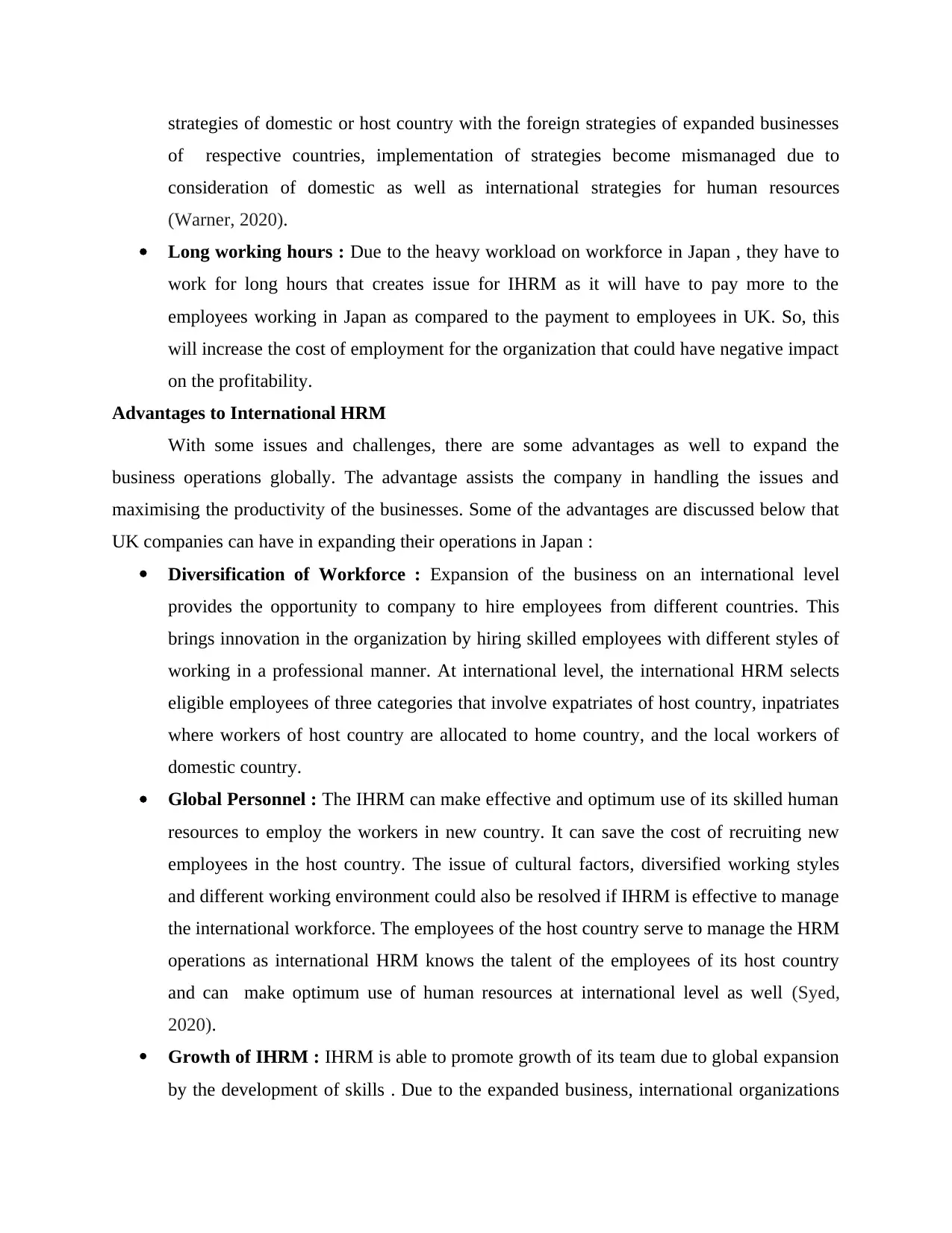
strategies of domestic or host country with the foreign strategies of expanded businesses
of respective countries, implementation of strategies become mismanaged due to
consideration of domestic as well as international strategies for human resources
(Warner, 2020).
Long working hours : Due to the heavy workload on workforce in Japan , they have to
work for long hours that creates issue for IHRM as it will have to pay more to the
employees working in Japan as compared to the payment to employees in UK. So, this
will increase the cost of employment for the organization that could have negative impact
on the profitability.
Advantages to International HRM
With some issues and challenges, there are some advantages as well to expand the
business operations globally. The advantage assists the company in handling the issues and
maximising the productivity of the businesses. Some of the advantages are discussed below that
UK companies can have in expanding their operations in Japan :
Diversification of Workforce : Expansion of the business on an international level
provides the opportunity to company to hire employees from different countries. This
brings innovation in the organization by hiring skilled employees with different styles of
working in a professional manner. At international level, the international HRM selects
eligible employees of three categories that involve expatriates of host country, inpatriates
where workers of host country are allocated to home country, and the local workers of
domestic country.
Global Personnel : The IHRM can make effective and optimum use of its skilled human
resources to employ the workers in new country. It can save the cost of recruiting new
employees in the host country. The issue of cultural factors, diversified working styles
and different working environment could also be resolved if IHRM is effective to manage
the international workforce. The employees of the host country serve to manage the HRM
operations as international HRM knows the talent of the employees of its host country
and can make optimum use of human resources at international level as well (Syed,
2020).
Growth of IHRM : IHRM is able to promote growth of its team due to global expansion
by the development of skills . Due to the expanded business, international organizations
of respective countries, implementation of strategies become mismanaged due to
consideration of domestic as well as international strategies for human resources
(Warner, 2020).
Long working hours : Due to the heavy workload on workforce in Japan , they have to
work for long hours that creates issue for IHRM as it will have to pay more to the
employees working in Japan as compared to the payment to employees in UK. So, this
will increase the cost of employment for the organization that could have negative impact
on the profitability.
Advantages to International HRM
With some issues and challenges, there are some advantages as well to expand the
business operations globally. The advantage assists the company in handling the issues and
maximising the productivity of the businesses. Some of the advantages are discussed below that
UK companies can have in expanding their operations in Japan :
Diversification of Workforce : Expansion of the business on an international level
provides the opportunity to company to hire employees from different countries. This
brings innovation in the organization by hiring skilled employees with different styles of
working in a professional manner. At international level, the international HRM selects
eligible employees of three categories that involve expatriates of host country, inpatriates
where workers of host country are allocated to home country, and the local workers of
domestic country.
Global Personnel : The IHRM can make effective and optimum use of its skilled human
resources to employ the workers in new country. It can save the cost of recruiting new
employees in the host country. The issue of cultural factors, diversified working styles
and different working environment could also be resolved if IHRM is effective to manage
the international workforce. The employees of the host country serve to manage the HRM
operations as international HRM knows the talent of the employees of its host country
and can make optimum use of human resources at international level as well (Syed,
2020).
Growth of IHRM : IHRM is able to promote growth of its team due to global expansion
by the development of skills . Due to the expanded business, international organizations
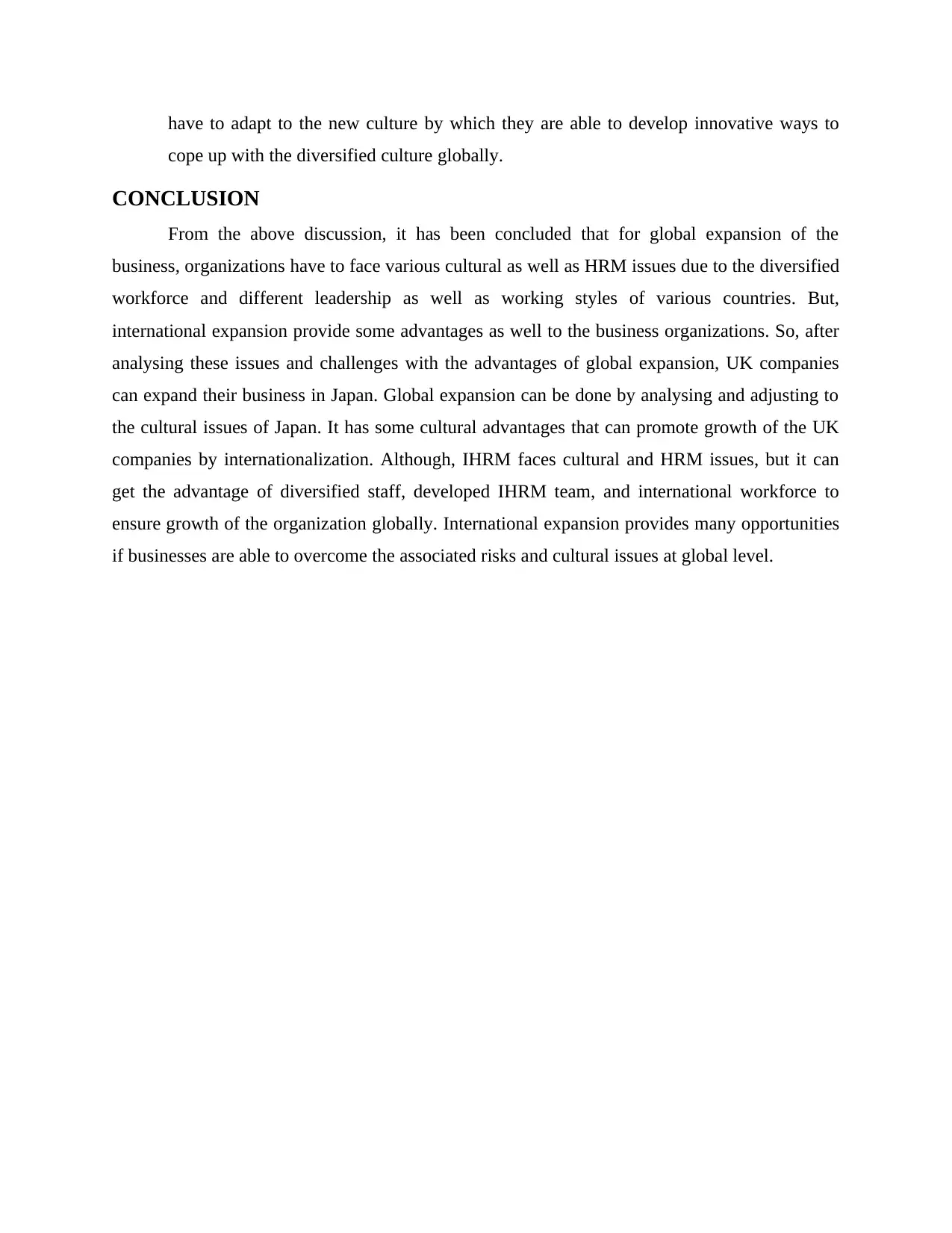
have to adapt to the new culture by which they are able to develop innovative ways to
cope up with the diversified culture globally.
CONCLUSION
From the above discussion, it has been concluded that for global expansion of the
business, organizations have to face various cultural as well as HRM issues due to the diversified
workforce and different leadership as well as working styles of various countries. But,
international expansion provide some advantages as well to the business organizations. So, after
analysing these issues and challenges with the advantages of global expansion, UK companies
can expand their business in Japan. Global expansion can be done by analysing and adjusting to
the cultural issues of Japan. It has some cultural advantages that can promote growth of the UK
companies by internationalization. Although, IHRM faces cultural and HRM issues, but it can
get the advantage of diversified staff, developed IHRM team, and international workforce to
ensure growth of the organization globally. International expansion provides many opportunities
if businesses are able to overcome the associated risks and cultural issues at global level.
cope up with the diversified culture globally.
CONCLUSION
From the above discussion, it has been concluded that for global expansion of the
business, organizations have to face various cultural as well as HRM issues due to the diversified
workforce and different leadership as well as working styles of various countries. But,
international expansion provide some advantages as well to the business organizations. So, after
analysing these issues and challenges with the advantages of global expansion, UK companies
can expand their business in Japan. Global expansion can be done by analysing and adjusting to
the cultural issues of Japan. It has some cultural advantages that can promote growth of the UK
companies by internationalization. Although, IHRM faces cultural and HRM issues, but it can
get the advantage of diversified staff, developed IHRM team, and international workforce to
ensure growth of the organization globally. International expansion provides many opportunities
if businesses are able to overcome the associated risks and cultural issues at global level.
⊘ This is a preview!⊘
Do you want full access?
Subscribe today to unlock all pages.

Trusted by 1+ million students worldwide
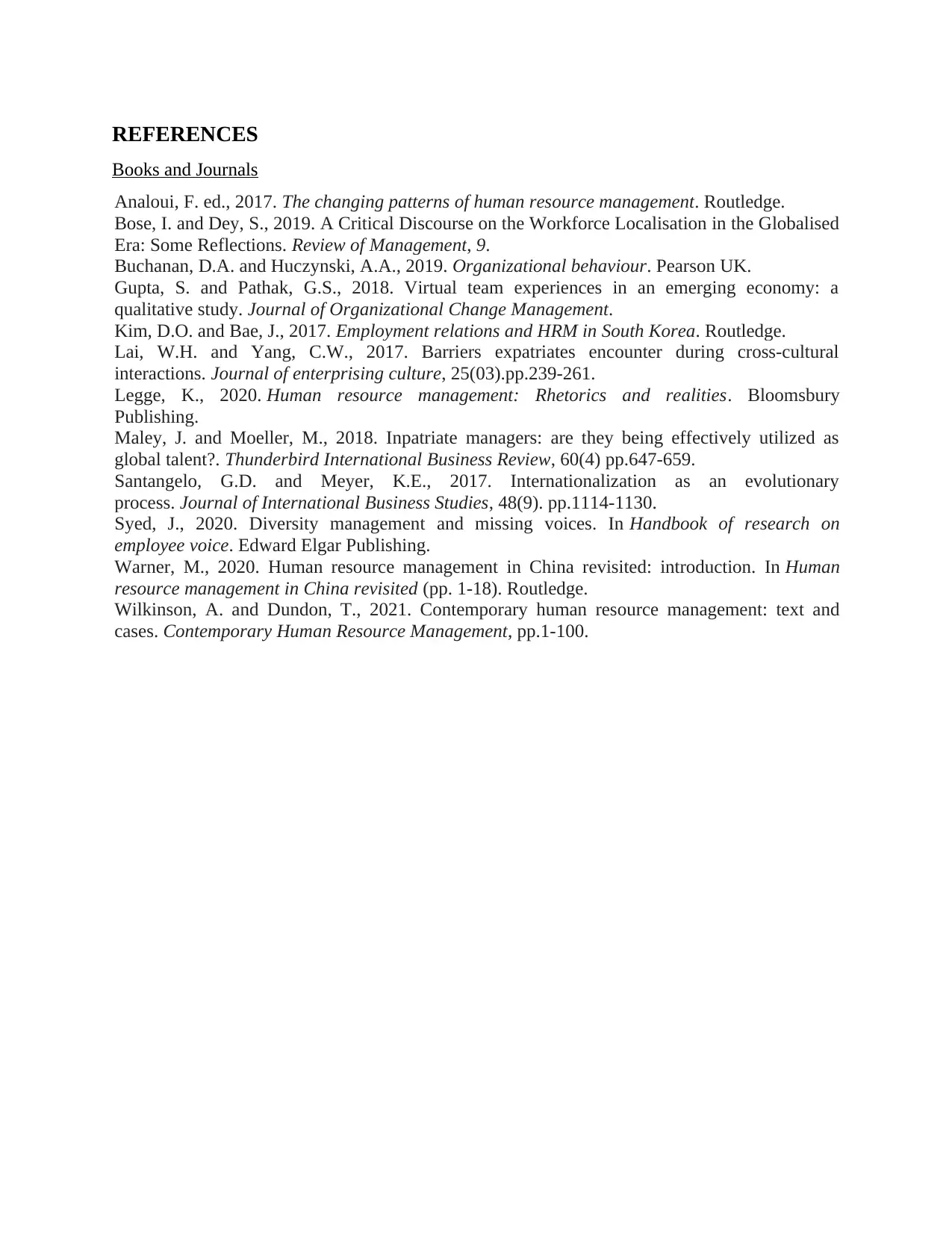
REFERENCES
Books and Journals
Analoui, F. ed., 2017. The changing patterns of human resource management. Routledge.
Bose, I. and Dey, S., 2019. A Critical Discourse on the Workforce Localisation in the Globalised
Era: Some Reflections. Review of Management, 9.
Buchanan, D.A. and Huczynski, A.A., 2019. Organizational behaviour. Pearson UK.
Gupta, S. and Pathak, G.S., 2018. Virtual team experiences in an emerging economy: a
qualitative study. Journal of Organizational Change Management.
Kim, D.O. and Bae, J., 2017. Employment relations and HRM in South Korea. Routledge.
Lai, W.H. and Yang, C.W., 2017. Barriers expatriates encounter during cross-cultural
interactions. Journal of enterprising culture, 25(03).pp.239-261.
Legge, K., 2020. Human resource management: Rhetorics and realities. Bloomsbury
Publishing.
Maley, J. and Moeller, M., 2018. Inpatriate managers: are they being effectively utilized as
global talent?. Thunderbird International Business Review, 60(4) pp.647-659.
Santangelo, G.D. and Meyer, K.E., 2017. Internationalization as an evolutionary
process. Journal of International Business Studies, 48(9). pp.1114-1130.
Syed, J., 2020. Diversity management and missing voices. In Handbook of research on
employee voice. Edward Elgar Publishing.
Warner, M., 2020. Human resource management in China revisited: introduction. In Human
resource management in China revisited (pp. 1-18). Routledge.
Wilkinson, A. and Dundon, T., 2021. Contemporary human resource management: text and
cases. Contemporary Human Resource Management, pp.1-100.
Books and Journals
Analoui, F. ed., 2017. The changing patterns of human resource management. Routledge.
Bose, I. and Dey, S., 2019. A Critical Discourse on the Workforce Localisation in the Globalised
Era: Some Reflections. Review of Management, 9.
Buchanan, D.A. and Huczynski, A.A., 2019. Organizational behaviour. Pearson UK.
Gupta, S. and Pathak, G.S., 2018. Virtual team experiences in an emerging economy: a
qualitative study. Journal of Organizational Change Management.
Kim, D.O. and Bae, J., 2017. Employment relations and HRM in South Korea. Routledge.
Lai, W.H. and Yang, C.W., 2017. Barriers expatriates encounter during cross-cultural
interactions. Journal of enterprising culture, 25(03).pp.239-261.
Legge, K., 2020. Human resource management: Rhetorics and realities. Bloomsbury
Publishing.
Maley, J. and Moeller, M., 2018. Inpatriate managers: are they being effectively utilized as
global talent?. Thunderbird International Business Review, 60(4) pp.647-659.
Santangelo, G.D. and Meyer, K.E., 2017. Internationalization as an evolutionary
process. Journal of International Business Studies, 48(9). pp.1114-1130.
Syed, J., 2020. Diversity management and missing voices. In Handbook of research on
employee voice. Edward Elgar Publishing.
Warner, M., 2020. Human resource management in China revisited: introduction. In Human
resource management in China revisited (pp. 1-18). Routledge.
Wilkinson, A. and Dundon, T., 2021. Contemporary human resource management: text and
cases. Contemporary Human Resource Management, pp.1-100.
1 out of 10
Related Documents
Your All-in-One AI-Powered Toolkit for Academic Success.
+13062052269
info@desklib.com
Available 24*7 on WhatsApp / Email
![[object Object]](/_next/static/media/star-bottom.7253800d.svg)
Unlock your academic potential
Copyright © 2020–2026 A2Z Services. All Rights Reserved. Developed and managed by ZUCOL.





